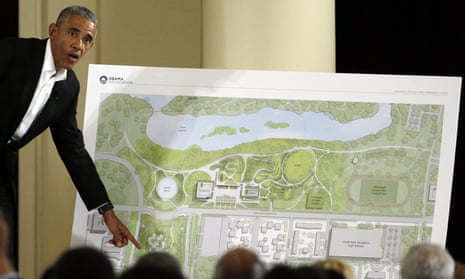Construction of the Obama Presidential Center is expected to begin this fall in Chicago after years of debate over whether the complex will benefit low-income residents of the surrounding neighborhoods.
It will be located in Jackson Park on the South Side of Chicago – one of the most historically significant parks in the city, and originally designed for the 27 million visitors to the 1893 World’s Fair. The roughly $500m Obama Presidential Center (OPC) will feature a museum, playground, public library and an open plaza.
Such presidential complexes are considered the physical embodiment of a president’s legacy, and though the OPC will not house the archives of a traditional presidential library, the center is noteworthy for its nod to the Obamas’ roots. Barack started his political career in the area and Michelle grew up in the nearby South Shore neighborhood.
But the development, expected to break ground this fall, has not arrived without controversy. Over the last six years, the Obama Foundation, which will fund the OPC, and the city of Chicago have courted scrutiny from two groups: park preservationists upset at a private development being built on public land, and community organizers who fear that low-income Black neighbors will be displaced by rising rents and land speculation.
Since 2018, Protect Our Parks has waged legal battles to prevent the park’s construction in Jackson Park, the second largest park on the South Side and home to more than 250 species of birds. The non-profit maintains that the development could be built at an alternative site about two miles from Jackson Park with minimal damage to the environment.
“This is a world-class park put together by Frederick Law Olmsted … and now somebody wants to gut it when, in fact, they can put it in a perfectly serviceable [location somewhere else],” said Richard Epstein, a constitutional law professor at the University of Chicago who represents Protect Our Parks.
A Protect Our Parks lawsuit against the city was struck down in 2020 by Amy Coney Barrett, then a US circuit court judge, and the organization’s petition for a supreme court review was recently denied. In April, the non-profit alleged in a second lawsuit that the OPC’s construction would “permanently destroy Jackson Park’s roadways, trees and overall integrity” and that the four federal regulatory reviews the site went through did not sufficiently consider alternative sites.

In response, the Obama Foundation said it was “prepared to defend against this lawsuit from Protect Our Parks” and that it plans to plant more trees on-site than exist now. The spokesperson told the Guardian that “a thorough selection process was conducted and completed regarding the location of the museum campus”.
Alderwoman Leslie Hairston, who represents some of the affected neighborhoods, is critical of park preservationists’ attempt to quash the development. “[The Protect Our Parks case] has been determined by a court of law to be uncredible,” Hairston said.
Neighbors’ response to the Obama Presidential Center has been cautious. Woodlawn, Washington Park and South Shore are predominantly Black low-income neighborhoods that have experienced the brunt of housing demolitions, discriminatory lending practices, and disinvestment since the 20th century. For residents used to empty promises, this new development could propel the community forward – or leave it behind.
A major flashpoint has been affordable housing. A University of Illinois at Chicago study found that housing prices in the area rose between 2010 and 2017. “While rents vary, there is clear evidence of rising rents in newly renovated and new construction units, which the majority of current renters cannot afford,” researchers wrote.
Some residents and community organizers have spent years saying the city, the Obama Foundation and others should reach an agreement that sets jobs aside for locals, protects affordable housing and supports Black businesses.
Dixon Romeo, an organizer in South Shore, said some ardent OPC supporters have mischaracterized such calls as opposed to the development itself. “Most folks you talk to understand that the issue isn’t [with] Barack Obama,” said Romeo. “We’re for the Center but not for displacement,” echoed Paru Brown, a coalition organizer with the Kenwood Oakland Community Organization.

Obama himself came out against these proposals in 2017. “I’m not an outsider here,” he said during a video conference at the time. “I know the neighborhood. I know that the minute you start saying, ‘Well, we’re thinking about signing something that will determine who’s getting jobs and contracts and this and that.’ Next thing I know, I’ve got 20 organizations coming out of the woodwork, some I’ve never heard of before.”
Even so, the Obama Foundation will require 50% of subcontracted vendors to be “diverse” and will fund $850,000 in workplace development training for 400 apprentices from the South and West Sides, according to a spokesperson.
And in September last year, the Chicago city council passed an ordinance committing millions to redeveloping vacant buildings and lots, funding home improvements and refinancing for homeowners, and assisting low- and middle-income renters in home ownership. Under this agreement, renters also get the right of first refusal if their landlord sells the building.
To Alderwoman Jeanette Taylor, who was elected in part because of her advocacy around the OPC, these policy shifts are personal. Before she was elected in 2019, she was an organizer and mother priced out of Bronzeville, another South Side neighborhood. When the OPC was first announced, she feared being displaced from Woodlawn. “I [couldn’t] afford to live anywhere else in the city,” she said.
Taylor was essential in the passage of the housing ordinance. Since then, she says her office’s interactions with the Obama Foundation and the University of Chicago, a major presence in the area, have been productive. “We don’t move without talking to each other. It’s a relationship where we’re learning to trust each other.”
But getting to that level of transparency was a years-long battle. “I don’t care if it’s the first Black president or Queen Elizabeth or Beyoncé. We got to hold people accountable.”
